3rd National Plan to Combat Piracy seeks the true dimension of counterfeit products in the economy. By Yan Boechat, for Valor, from São Paulo.
View the full article in PDF (4 pages, 975Kb)
Source: Valor Econômico, 26/04/2013
3rd National Plan to Combat Piracy seeks the true dimension of counterfeit products in the economy. By Yan Boechat, for Valor, from São Paulo.
View the full article in PDF (4 pages, 975Kb)
Source: Valor Econômico, 26/04/2013
Source: Tax News
The institute's executive president, Roberto Abdenur, will participate in a panel at ENCAT with representatives from the Finance Secretariats of SP and MG
The executive president of the Brazilian Institute of Ethics in Competition (ETCO), Roberto Abdenur, will participate next Wednesday (20), at 9:40 am, of the 47th National Meeting of State Tax Coordinators and Administrators (ENCAT), in Salvador, Bahia. The executive will give a lecture during the panel Combating Illegal Trade, which will also be attended by the representative of the Finance Secretariat of Minas Gerais, Marcos Rogério Baeta Pereira, and the representative of the Finance Secretariat of São Paulo, José Eduardo de Paula Saran.
In his lecture, Abdenur, he will show all the actions developed by ETCO to support the fight against illegal trade in the country since its foundation, in 2003. Member of the National Council to Combat Piracy and Intellectual Property Offenses (CNCP), ETCO since 2009, he has been the manager of the Cidade Livre de Piracy Program. "Brazil has, in piracy, a serious challenge for development, a relatively new social and economic phenomenon, but one that grows exponentially, supported by criminal organizations", says Abdenur.
According to Eudaldo Almeida de Jesus, general coordinator of ENCAT, the choice of this approach was strategic for the current Brazilian scenario. "The definition of the theme occurred in the last ENCAT, since piracy and illegal trade violate the legislation, resulting in tax evasion and a consequent reduction in revenue for the States".
The 47th National Meeting of State Tax Coordinators and Administrators (ENCAT) takes place from March 18 to 21 in Salvador, BA.
About the Free Piracy City
As a member of the National Council for Combating Piracy and Intellectual Property Offenses (CNCP), an organ of the Ministry of Justice, ETCO has been managing the Cidade Livre de Piracy program since 2009. Started in 2010 and already implemented in São Paulo, Curitiba, Brasília, Belo Horizonte, Osasco, Vitória and Rio de Janeiro, the project municipalizes the fight against illegal trade in products. ETCO's goal is to involve all the host cities for the 2014 FIFA World Cup in the program.
About ETCO
The Brazilian Institute of Ethics in Competition, ETCO, is a civil society organization of public interest (OSCIP) founded in 2003 with the objective of identifying, discussing, proposing and supporting actions, practices and projects that result in concrete improvement of the business environment in the Brazil. To this end, it acts to influence decision-makers to adopt measures aimed at reducing tax evasion, illegal trade and informality, in addition to actions to simplify the tax system and combat corruption and other misconduct. The institute seeks to maintain a strong presence in the Brazilian business and political circles in order to create mechanisms and tools that strengthen competitive ethics. There are three action strategies: to foster studies on the factors that encourage these deviations in conduct; propose and support initiatives, actions or changes in legal texts and administrative practices; and to develop and support actions to raise public awareness about the harmful social and economic effects and the dangers of these illegalities and social leniency with these deviations from ethical behavior.
The Brazilian Association of Software Companies (ABES) and the Brazilian Intellectual Property Association (ABPI) formalized a partnership for the Legal Entrepreneur campaign, which will be officially launched by ABES in late March, with support from ETCO.
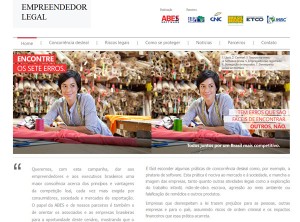
The formalization of the partnership took place on the last 14th, during a lunch organized by ABPI, in Rio de Janeiro, for its associates and partners. The event was attended by Rodolfo Tamanaha, executive secretary of the National Council for Combating Piracy and Crimes against Intellectual Property (CNPC), and a lecture by Deputy Alessandro Molon, on the Marco Civil da Internet project.
The main objective of the campaign is to encourage the legalized use of technology, be it software or hardware, among Brazilian entrepreneurs in any segment. “ABPI's strong role in promoting the culture of intellectual property will be essential to raise the awareness of the largest possible number of professionals about the importance of legalized IT, so that an environment of fair competition prevails within the country,” said the president of ABES, Gérson Schmitt.
For the president of ABPI, Luiz Henrique do Amaral, “the dissemination of good business ethics is a first-rate item to guarantee the growth and sustainability of companies”. According to him, “in this new scenario of opportunities that is unfolding globally, where Brazil is already emerging as one of the most promising economies, there is only room for those who operate within the good rules of competition and respect for intellectual property rights. ”.
The institute's executive president, Roberto Abdenur, participates in a panel at ENCAT with representatives from the Finance Secretariats of São Paulo and Minas Gerais.
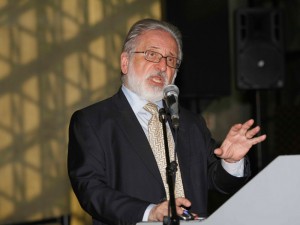
The executive president of the Brazilian Institute of Ethics in Competition (ETCO), Roberto Abdenur, participates this Wednesday (March 20), at 9:40 am, of the 47th National Meeting of State Tax Coordinators and Administrators (ENCAT), in Salvador, Bahia. The executive will give a lecture during the panel Combating Illegal Trade, which will also be attended by the representative of the Finance Secretariat of Minas Gerais, Marcos Rogério Baeta Pereira, and the representative of the Finance Secretariat of São Paulo, José Eduardo de Paula Saran.
In his lecture, Abdenur will show all the actions developed by ETCO to support the fight against illegal trade in the country since its foundation, in 2003. Member of the National Council to Combat Piracy and Intellectual Property Offenses (CNCP), ETCO is since 2009, the manager of the Cidade Livre de Pirataria Program. "Brazil has, in piracy, a serious challenge for development, a relatively new social and economic phenomenon, but one that grows exponentially, supported by criminal organizations", says Abdenur.
According to Eudaldo Almeida de Jesus, general coordinator of ENCAT, the choice of this approach was strategic for the current Brazilian scenario. "The definition of the theme occurred in the last ENCAT, since piracy and illegal trade violate the legislation, resulting in tax evasion and a consequent reduction in revenue for the States."
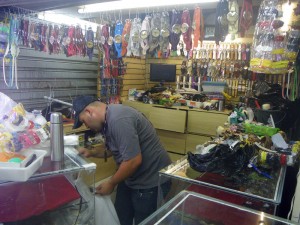
Press Release / Municipal Secretariat for Urban Security
The Procon-SP Foundation fined R $ 5 million to mall management companies in downtown São Paulo for piracy and illegal trade in products. In the 11 establishments, 16 million illegal products were seized.
The verification of irregularities occurred during the inspection carried out by the Integrated Security Management Office (GGI) and coordinated by the Municipal Secretariat of Urban Security of São Paulo, following the objectives of the Cidade Livre de Pirataria Program, which is managed by ETCO.
The action demonstrates the importance of integrating various public bodies and civil institutions for effectiveness in combating piracy and illegal trade. The initiative was only possible once Procon-SP, as a member of the Committee to Combat Piracy, participates in the operations coordinated by the Secretariat and has access to reports of the results of the seizures.
The company Maxim Administração e Participações Ltda., Fined R $ 4,5 million, manages the shopping malls 25 de Março I, II and III, Jhuta Fashion Mall, Korai, Galerias Imperial, 39, Boa, 960 and Florêncio, all located at Brás and Rua 25 de Março. The company Mundo Oriental Patrimonial, fined R $ 458 thousand, is responsible for the homonymous shopping mall Mundo Oriental, also in the city center.
Balance
Since 2010, when São Paulo joined the Cidade Livre de Pirataria Program, until now, the integrated actions of GGI totaled 49 joint operations and 128 one-off operations, which seized a total of 78 million illegal products. Of this total, 53 million were in commercial establishments - predominantly clothes, bags, watches and sneakers - and 25 million on the streets of the city, including CDs and DVDs, clothing and electronic accessories.
Of the products seized in commercial establishments, valued at more than R $ 2 billion, more than 50% have already been destroyed, with the recycling of materials, except for those listed in police investigations, those pending administrative resources and those that are pending to authorize the undoing.
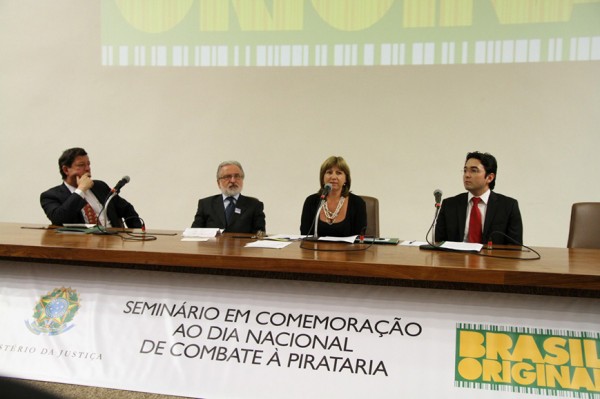
The fight against piracy in the country gained important reinforcement with the signing of the agreement between the city of Vitória, ES, and the National Council for Combating Piracy and Intellectual Property Offenses (CNCP) of the Ministry of Justice. Under the agreement, the capital of Espírito Santo becomes the 9th municipality in the program, which is coordinated by ETCO.
The act took place during an event in celebration of the National Day to Combat Piracy - December 3 - held at the headquarters of the Ministry of Justice, in Brasília. The city of Vitória was represented by the municipal secretary of Urban Security, Alcemir Pantaleão Sobrinho. Through the CNCP, the president of the Council, Márcia Pelegrini, signed the agreement. The program now has six state capitals - São Paulo, Curitiba, Belo Horizonte, Rio de Janeiro, Cuiabá and Vitória - in addition to Brasília (DF) and the municipalities of Várzea Grande (MT) and Osasco (SP).
At the opening of the event, the Minister of Justice, José Eduardo Cardozo, emphasized the need to face the crime of piracy. “The fight against piracy belongs to society and the Brazilian State. Piracy is connected to organized crime, which is why we are recognizing entities that develop actions in this area. This is an important role, which can encourage other initiatives, ”said the minister.
With the emphasis on the need to raise society's awareness of the importance of buying original products in order not to feed organized crime, the event also featured a seminar consisting of four lectures. The chief executive of ETCO, Roberto Abdenur, spoke about the progress of the Cidade Livre de Pirataria project and recalled that the CNCP will complete 10 years in 2014. “Although there has been a lot of progress in this period, there are still many challenges ahead. It is always worth remembering that the practice of piracy affects the country's image and inhibits foreign investments, ”said Abdenur.
In his lecture, the Municipal Secretary of Urban Security of São Paulo, Edson Ortega, showed data on the experience of the Secretariat of Urban Security of the Municipality of São Paulo in combating piracy. Between December 2010 and October 2012, 72 million goods were seized in the capital, which is equivalent to R $ 2,5 billion. São Paulo was the first municipality to join the Cidade Livre de Pirataria program.
The executive chairman of the National Forum Against Piracy and Illegality (FNCP), Edson Luiz Vismona, presented the theme “Panorama of Piracy and Offenses against Intellectual Property today”.
At the end of the seminar, the executive secretary of the CNCP, Rodolfo Tamanaha, presented the initial outline of the diagnosis of the National Plan to Combat Piracy. Lawyer, master of the University of Brasilia, Tamanaha stressed the need to discourage society from consuming pirated products. "We don't want to stigmatize the consumer, but we need to understand the barriers to accessing consumption," he warned.
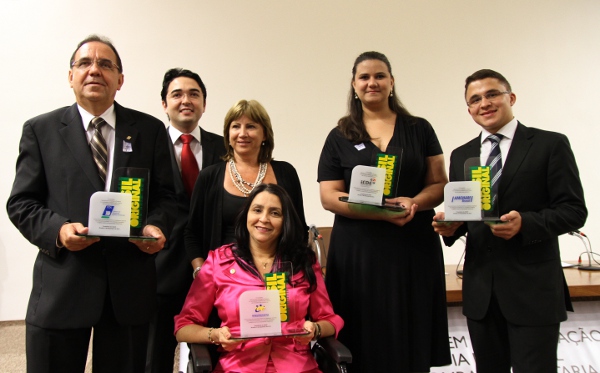
Among the celebrations of the National Day to Combat Piracy - December 3 - the ceremony to deliver the II National Combating Piracy. This year, the initiatives entered by country were chosen, in addition to the National category.
In the second edition of the Award, which is supported by ETCO, actions to combat piracy carried out between August 2011 and July 2012 were evaluated, based on criteria such as impact and benefit on society and the economy; initiative innovation and creativity; planning and coordination and potential for example and internal motivation. The choice of initiatives was made by region. Actions carried out in the Northeast, South and Southeast were awarded. The North region had no representatives registered.
Institute for Combating Fraud and Defending Competition (ICDE)
Fraud Identification Project in the Wine Sector
Representative: Rodrigo Lagreca
The initiative promoted research in 49 wineries that identified irregularities in the tax register in 23,6% of the 3.582 gondola fronts, resulting in tax evasion due to tax avoidance (planning that uses legal methods to reduce the burden of the tax burden in a given budget) .
The action showed that the inspection for the presence of seals in the wine segment must be strict and the corrections for the correct circulation of goods classified as cocktails should be controlled more intensively, to avoid problems with counterfeit seals and different tax classifications. that is sold. This procedure - tax avoidance - proved to be the biggest finding in the lawsuit.
The main impact for society was the finding of fraud related to tax evasion and circumvention of public controls (such as the presence of the Tax Seal), something that has a great impact on tax collection and public health exposure of consumers. The case was reported to the State Prosecutor's Office.
The discovery of tax evasion attitudes in the wine industry has an impact on unfair trade between manufacturers and harms those who act within legal norms. Thus, the regularization of the situation and compliance with the competition rules will bring benefits to producers who act legally.
Amcham - American Chamber of Commerce
Legal School Project - Education: the best path for citizenship
Representative: Felipe Magrim
The initiative by Amcham and partners was created to alert children and youth in elementary education (between 7 and 14 years old) of public and private education networks to the problem of piracy in Brazil and in the world. Within the activities of the Legal School Project, moral and ethical values and the emphasis on the importance of a citizen attitude are the basis of the discussion on the consequences of the consumption of pirated products and the use of illegal trade.
The objective of the project is to act in the fight against piracy through the awareness and social responsibility of children and young people. The project addresses topics such as the importance of the concept of intellectual property, highlights the problems caused by piracy, in addition to addressing issues related to values such as ethics, morals, citizenship and a sense of collectivity. The project has existed since 2007 and has already operated in 315 schools, which adds up to more than 46 thousand participating students and 4 thousand educators who are sensitized.
Salvador (BA) Chamber of Legal Officers (CDL)
Integrated Legal Trade Operation
Representative: Haroldo Dias Núñez
The action was created five years ago, with mobilization initiatives carried out by the CDL Salvador Trade Council with leaders from federal, state and municipal bodies, as well as organized civil society entities. The objective is to raise the population's awareness of the problem and combat piracy and illegal trade in Salvador and the rest of the state.
The operation was initiated because of the increase in the number of street vendors selling products of dubious origin and of poor quality. This type of trade is illegal and generates losses not only to the State, but to the entire population, by not collecting taxes. It also affects traders who act legally. Monthly meetings are held in which a topic is chosen and discussed until a consensus is reached, which is adopted by the group.
The results achieved are faster actions to combat piracy, because, through these meetings, all participants have direct contact with representatives of other bodies, thus avoiding the bureaucracy's slowness. The result is so positive that the Army participates in the initiative, lending warehouses to store seizures of illegal products.
National Union of Tax Analysts of the Federal Revenue of Brazil - Sindireceita
National Campaign “Pirate: I'm out! Only original use ”
Representative: Sílvia Helena de Alencar Felismino (President)
Launched by Sindireceita in 2005, the campaign aims to expand the debate on piracy in Brazil and alert the population to the risks to which they are exposed when buying pirated products. The initiative shows that, when purchasing these products, jobs and taxes are lost, and the entire economy of the country is affected. With the theme: “Viva a Originalidade”, the Campaign, in 2011, changed its communication strategy, which started to call attention to the need to value original ideas, attitudes, projects and products. This was the new way found to facilitate the identification of society and the artistic class with the problem of piracy. The adopted strategy also aims to reach a younger audience, closely linked to the idea of sharing brought by the digital age, but little integrated into the debate on intellectual property.
The actions are developed on several fronts, such as popular parties (carnival, Festival de Parintins); audiovisual production (documentaries and advertising campaigns); dissemination in print and television media, internet and on social networks; in addition to lectures given by the tax auditors of the Federal Revenue, ensuring wide reach in Brazilian society.
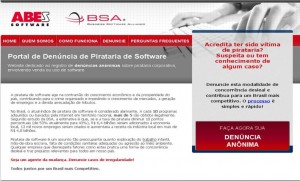
On November 6, the Brazilian Association of Software Companies (ABES) and The Software Alliance (BSA) launched the Software Piracy Reporting Portal, focusing on companies and resellers that use or market programs without proper licensing.
In Brazil, the current piracy rate is considered alarming. According to data from the BSA, for every ten programs purchased or downloaded over the internet in Brazil, more than five are obtained illegally. It is estimated that, if the piracy rate decreased by 10 percentage points in the next four years (from the current 53% to 43%), almost R $ 8 billion would be added to the industry's revenue, of which 74% would remain in the country (R $ 5,8 billion). In addition, this reduction would allow the creation of more than 12 thousand jobs in the sector.
According to Gérson Schmitt, president of ABES, this initiative is important to promote fair competition and contribute to the growth of Brazil. “When we reduce piracy, we create jobs, contribute to the country's economic development and improve the image of Brazilian companies on the world stage”, says Schmitt.
For the president of BSA in Brazil, Frank Caramuru, “companies must maintain control of their software assets and resellers must ensure that they are only selling original products, as irregularities involve imprisonment for 1 to 4 years, fine and indemnity that can reach three thousand times the value of each software ”. The expectation is that this portal will directly contribute to the reduction of software piracy in Brazil.
Reports are anonymous and must be forwarded through the website www.denuciepirataria.org.br. They will be investigated by the two associations and, if there is an indication of irregularity, necessary measures will be taken to ensure that cases are resolved quickly. "We can inform software manufacturers and local authorities, in addition to filing lawsuits to ensure that Brazil's software law is respected," says Caramuru. (With information from ABES Advisory).
